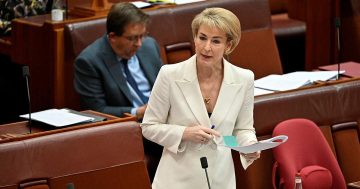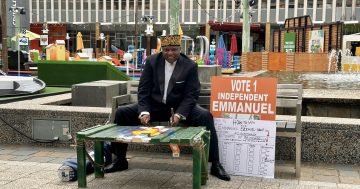
So now the fourth estate feeding frenzy is happening about Cory Bernardi, I wonder why all the hype.
He’s fitting into the shoes of that other famous South Australian, Don Chipp, who left the Libs (after being a high-profile minister) and founded the Australian Democrats. Remember that lot? Rather a long time in the candle light but burnt out nonetheless.
We even had a Democrat in the ACT Legislative Assembly for one term. Anyone remember Roslyn Dundas? Minor parties often have a short time in the sun.
The ACT’s early days were odd ones indeed. The plethora of minor single issue parties, whose life expectancy was in weeks, plagued the growing up of the Legislative Assembly. The No Self Government Party (which gained two members, one of whom was a minister), the Abolish Self Government Party (one member) the Residents Rally (a NIMBY group with a couple of members) had a flash in the pan appearance in politics, with the only successful member of that bunch being Michael Moore, who became an independent and later formed his own party.
In 1998, the Liberals won government with Carnell, Humphries, Kaine, Cornwell, Smyth, Hird and Stefaniak, leaving as the ALP Opposition Stanhope, Berry, Quinlan, Corbell, Wood and myself. The cross bench was Osborne and Rugendyke (independents), Tucker (Greens) and Moore (independent because he had shed the Residents Rally tag).
Now here’s the thing. Kaine had been a previous Chief Minister and had been ousted by Carnell. When they formed government in 1998, he was offered a minor portfolio and went to the backbench in disgust. Later in the term, he resigned from the Liberal Party and went to the cross bench.
Carnell et al were worried about a no-confidence motion in the Libs getting up and needed to have at least seven people on the government benches so they enticed Michael Moore to join the government in coalition (after his long list of demands were guaranteed) and so the Government had the one extra vote to stave off any challenge.
When Kaine resigned from the Libs, the outcry from Libs everywhere was for him to resign because he was elected as a Lib and if he wasn’t one then he should leave. Ring a bell with Bernardi and the calls for him to resign?
When Kaine formed his own party, the United Canberra Party, he lost the election in 2001.
In the rather stormy days of the next Assembly, Cross was given a rough time by the Libs and in the end, she resigned from the Libs and went to the crossbench. At the 2004 election, she ran against the Libs and was defeated.
The pattern here is that where an elected pollie leaves the party which spawned them and either forms another party or runs as an independent, the odds are high that they will be defeated at that election. Exceptions are always about and Bob Katter is one of them. Michael Moore shed the Residents Rally and formed the Michael Moore Independent Group with Helen Szuty and this group survived for one term. But the rule usually holds.
Bernardi’s chances of re-election are next to none. He’s banking on the rejection of the major parties and the presentation of radical right and left wing splinter groups, like Pauline Hanson or Jacqui Lambie, as his insurance policy.
Well, he should learn a lesson from the ACT, young as it is.
In the 1989 election, every loony in the world presented themselves and a bunch of non-major party candidates were elected. Only two survived the 1992 election – Michael Moore and Dennis Stevenson from the Abolish Self Government Party.
As an aside, it should be remembered that the election in 1989 was by the modified D’Hondt system of seats across the ACT, and was so until 1998 when the Hare-Clark system of electorates was introduced. And so, the bigger the electorate, the easier it is for minor groups of protest votes to get up.
The 1995 election saw two Greens (Tucker and Horodny) and two independents (Moore and Osborne) join the two major parties. But really Moore ran as a member of the Moore Independents and as such really represented a “party”.
The same result happened in 1998 with four people on the cross bench, one Green and three independents.
But in 2001, the cross bench started with only two members, each from a minor party, the Greens and the Democrats. They were joined later by Helen Cross who left the Libs. Moore had exited, Osborne and Rugendyke were defeated and the notion of “independent” was squashed, possibly forever. Howls at Cross to resign came from the Libs just as for Kaine and Bernardi.
In 2004, there were no independents under any guise. Labor had nine seats, the Libs had eight and the Greens had one. But by this stage the Greens were a recognised political force with a political infrastructure which was robust, not just an independent with a “party” tag to maximise the vote on preferential voting.
2008 saw a cleaner three way split, with Labor having seven, the Libs six and the Greens four. Again, a rejection of independents in favour of the major parties with the distribution among the parties being the only issue.
2012 saw a redistribution of the proportions with Labor and the Libs having eight each and Rattenbury from the Greens going with Labor, in exchange for a ministry.
So, while it may be the case elsewhere in the country perhaps, that there is an embracement of anti-establishment groupings and high profile individuals, it is not the case here.
I suggest that the voting patterns here should be looked at by those rebels and those for whom destiny beckons to greatness, and one can see the brevity of the time in the sun or near the candle.
Bernardi will go the way of Don Chipp, Trevor Kaine and Helen Cross, the fringe parties will go the way of the No Self Government Party, the Abolish Self Government Party and the Residents Rally, and the country will be governed by a distribution between Labor, the LNP and the Greens, with the odd mosquito giving them grief.
Whaddya think?




















